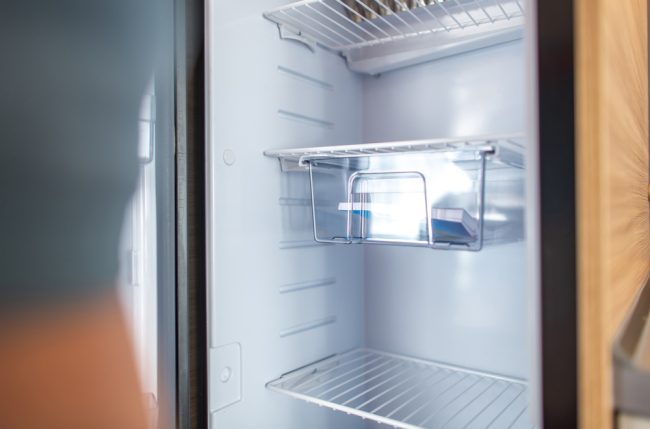A refrigerator is the heart of any camper kitchen. The 2008 Tiffin Phaeton I owned came equipped with a Norcold refrigerator that could operate on either propane or AC power.
Residential refrigerators are quiet, dependable and designed to last. They also tend to be less finicky than gas absorption refrigerators.
RV Refrigerators
If you go off the grid for your camping trips, an RV refrigerator that can run on both gas and electricity is ideal. Absorption fridges are the most common in RVs and can either run on LP (propane) or on AC power, with some models automatically switching between these options depending on the available power sources.
These refrigerators use a complex chemical process to keep food cold. They burn propane to heat up a set of tubes that absorb and hold coolant, evaporating the liquid to keep the freezer cold.
Compressor fridges are another popular choice for RVers and use a compressor to create cold air. They are most similar to residential fridges and can be powered by your RV’s 12-volt battery or plug into a portable solar panel or small windmill for off-grid RVing. These fridges tend to be smaller, but can still fit plenty of food and drinks. To maximize their performance, you should keep the door closed as much as possible and use the refrigerator fan to help circulate air while it’s running.
RV AC/DC Refrigerators
RV refrigerators are available in a wide variety of styles to suit your family’s needs. Options include absorption two-way and three-way fridges, residential-style 120V AC refrigerators, and the newest 12V DC compressor refrigerators.
A typical RV absorption fridge uses a chemical process to cool by changing the phase of an ammonia-based refrigerant from liquid to vapor to back again. This is a good choice for RVers who only camp at campgrounds with lots of trees and shade, because they can save on electricity costs by using the gas mode when camping away from power sources.
The downside is that absorption refrigerators don’t cool as well or quickly as compressor-based models, especially in hot ambient temperatures. The POLAR N10DC refrigerator from Norcold offers a great option, as it runs on both propane and 12V DC (using an inverter between the battery bank and the refrigerator). It also features a “night mode” that reduces compressor and fan speeds to help you sleep better at night while conserving energy use.
RV AC/DC Freezers
These portable refrigerators are compressor-powered which means that they can cool more consistently than an RV absorption fridge (like the 3-way Norcold in most campers) and they can deep freeze much better. They feature an exceptionally quiet, hermetically-sealed Danfoss compressor that’s dependable at higher ambient temperatures and doesn’t make disturbing noise.
They work off DC power which is the type of energy stored in your house batteries or generated by your solar panels when you’re camping off the grid. They are more efficient than AC fridges when plugged into an RV converter and won’t drain your battery as fast.
These portable RV refrigerators/freezers come in a wide variety of sizes and styles so that you can find the one that fits perfectly into your van or camper. For instance, you can get one that’s hinged a certain way or that can be set to open either way depending on your setup. They also come with a user-friendly control panel and LED display that’s easy to read.
RV AC/DC Conversion Kits
Power is essential when boondocking, but it’s not always available. RV campgrounds often have power stations, but they primarily provide 110v power, while most campervan appliances use 12v power. A RecPro 4-Stage Smart Converter/Charger is a solution that converts AC shore power to 12v DC and charges your batteries, too. It has four battery charging stages: Fast Charge quickly fills a low battery, Standard Charge maintains a full charge while powering 12V devices, Trickle Charge reduces battery self-discharge, and Equalization Charge removes sulfate from the cells to extend their life.
This system also works with solar panels and a diesel generator for off-the-grid camping. It’s easy to monitor energy use with settings and real-time data tracking from the EcoFlow Power Kit app and console. It can also be integrated into any van size with a custom mounting kit. Furrion’s Aerodynamic Chill HE RV roof air conditioner features dual fans that increase cooling efficiency while lowering operating noise. It uses less energy than a single-fan unit that’s commonly installed in RVs.norcold camper ac

